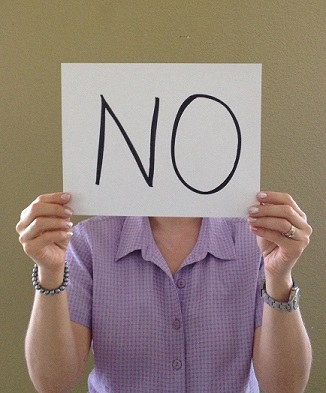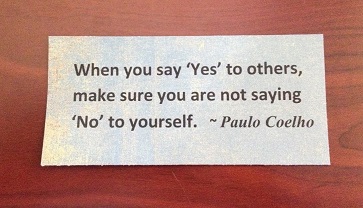 I just have to crow about being ahead of the curve with my 8 ways to Say No blog in August.
I just have to crow about being ahead of the curve with my 8 ways to Say No blog in August.
Since then, Real Simple magazine featured the article ‘The Nicest way to say No’ on the September cover. The same month, Kathie England taught ‘8 Ways to Say ‘No’ ‘ in her Time out for Success teleclass. Finally, Grants Pass radio station K-LOVE aired a piece about saying ‘No.’
What is it about saying ‘No?’ Why is it so difficult for so many people, especially women?
Why Saying ‘No’ is so hard to do:
Reason 1: You are unsure of your priorities
If your goals are clear and you know what needs to be accomplished today or this week, saying ‘No’ will be much easier. However, if you have not planned the week and have only a vague idea what you need or want to accomplish, you become vulnerable to outside requests for help.
Reason 2: Your fear of social awkwardness
 A legitimate fear: it is much easier in the short term to say ‘Yes’ and have the asker be happy and grateful to you. Nobody likes being told no. See Tip #2 below!
A legitimate fear: it is much easier in the short term to say ‘Yes’ and have the asker be happy and grateful to you. Nobody likes being told no. See Tip #2 below!
Here are 3 tips to make it easier: England shared from McKeown’s book:
- Separate the decision from the relationship.
You are not saying no to the friendship, it doesn’t mean you don’t want to be friends anymore; it does mean you are unable to say yes to their request for your time, money, etc. This requires validating the asker and, in some cases, explaining why it won’t be possible for you.
- Make your peace with the fact that saying “No” often requires trading popularity for respect.
People pleasers are the ones that often get in trouble by saying a reflexive “Yes.” Women especially have trouble with this. You want to be the teacher’s pet! Only it’s not school, where you need to please the teacher for a good grade—it is life. You don’t have to please the president of your networking group, the fundraiser, the PTA president, the principal, etc—you have your own priorities of family, work, your own interests. Saying “yes” to everything will ensure you do not have time for yourself. The end result will be burnout and resentment if you are neglecting your own needs to help others.
- Remember saying “No” can be more graceful than a noncommittal “Yes.”
Think about it. Just because you like the person or you believe their cause is a good idea is not enough. Maybe you would like to help, but deep down inside you know you don’t have time or energy to do it or have no intention of doing it. It is much better to decline at the outset. This way, you don’t set up false expectations.
When I was in college, I worked for a firm selling credit cards to people. I was horrible at it, but one thing I learned: I would rather have a prospect interrupt with a “No” at the beginning of the call than listen to my whole pitch before saying no. They wasted time for both parties.
The same applies to people asking for a favor. If you say yes but don’t mean it, they are counting on you. But if you back out or don’t follow through, they won’t know until the last minute and then they are in a bind. That is when hard feelings are created. It is much better to give a decisive ‘No’ at the outset to avoid setting up false expectations (their end), guilt (your end), and the fallout that will inevitably ensue.
So, armed with this new knowledge and motivation to be true to your own priorities, you will be able to say “No”!
How did this post help you? I would love to hear your story!
Content from Kathie England’s teleclass is based on Essentialism by Greg McKeown.





